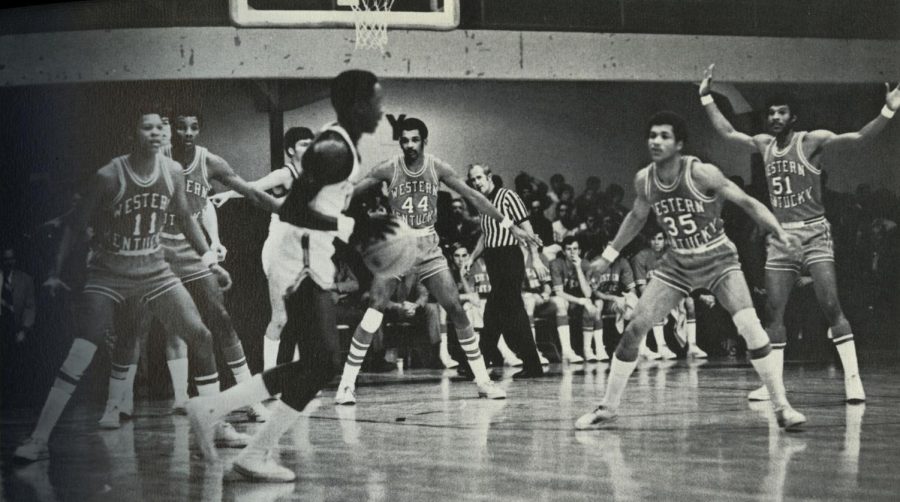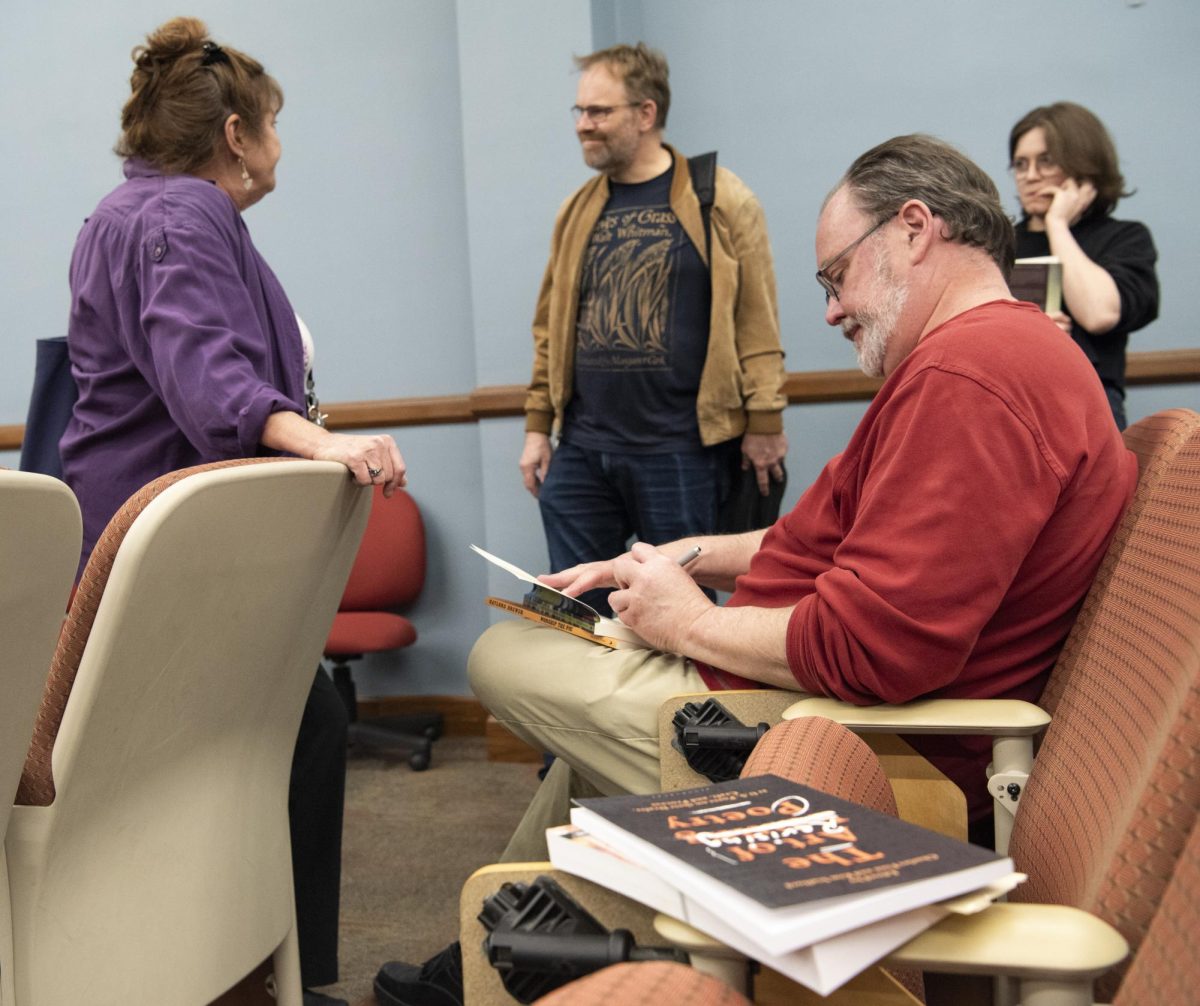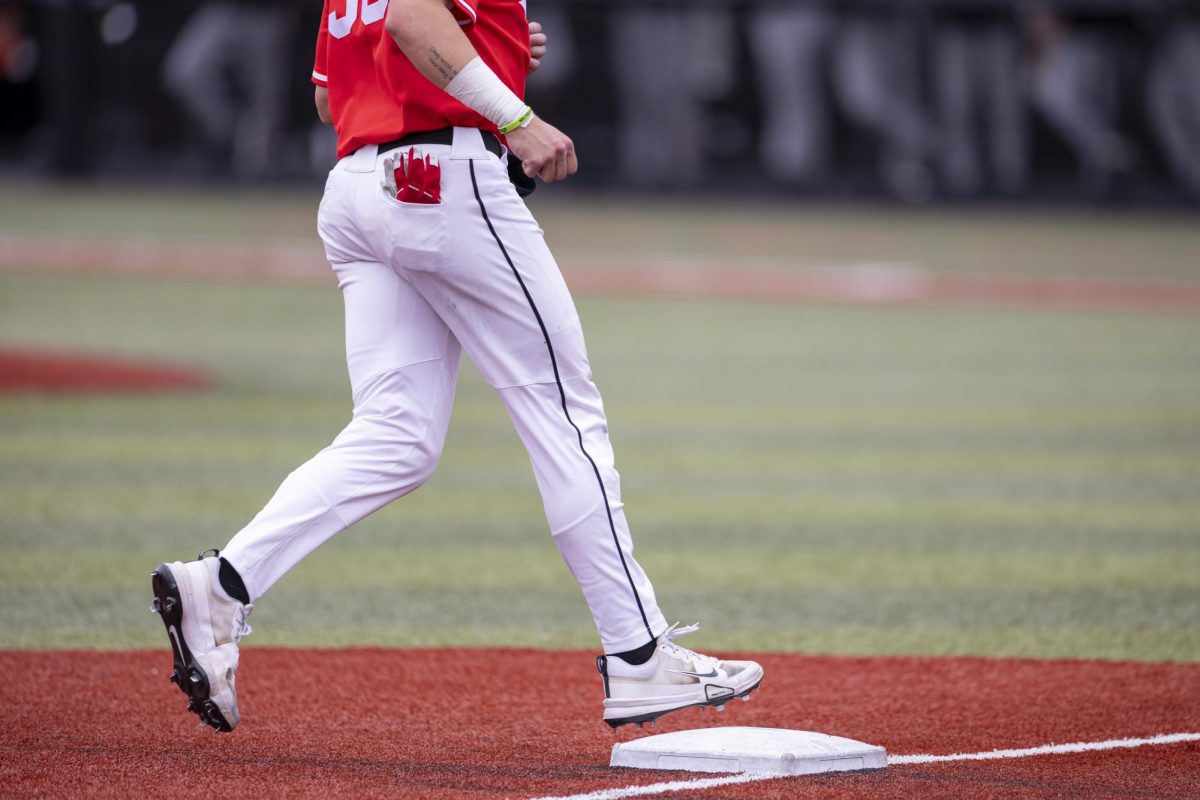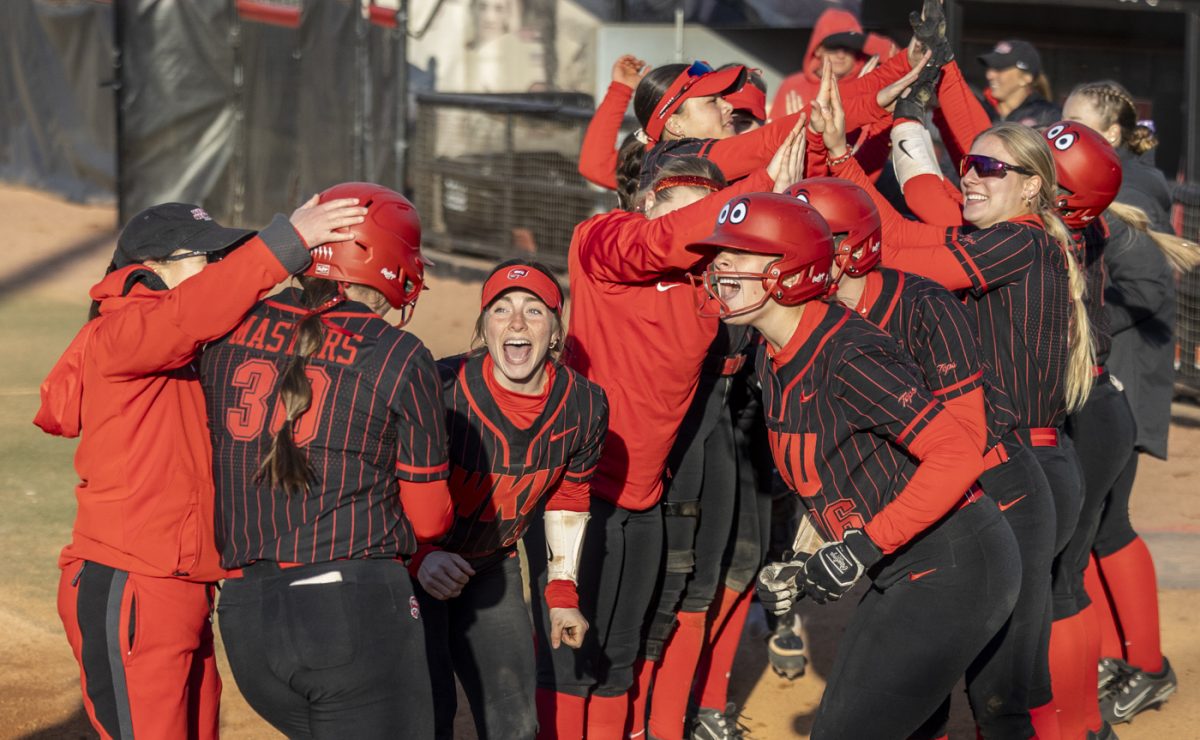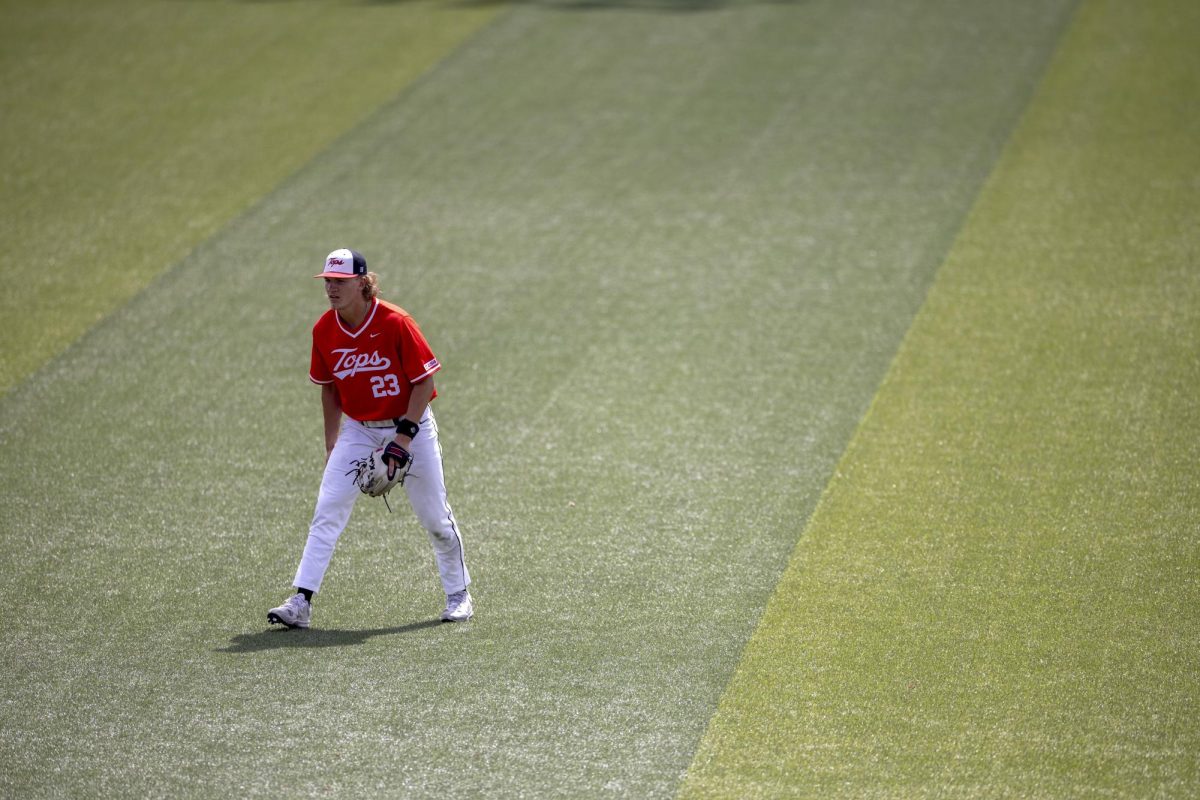Standing Alone: WKU’s 1971 Final Four team remains in a league of its own
April 2, 2014
It’s the fall of 1970 just before the Western Kentucky men’s basketball team left for the preseason National Invitation Tournament in New York City. Coach John Oldham was called into the office of president Dero Downing in the Wetherby Administration Building.
Two prominent members of the Board of Regents needed to express concern on a decision Oldham was going to make that would change the landscape of athletics at Western.
One of them was worried that Oldham was going to do what had never been done in Kentucky, start five African-American players.
“He said to me, ‘Will you change your mind?’”, Oldham, 90, said. “I told him that’s the five best players I’ve got. And he said, ‘Well, I won’t be coming anymore.’”
That regent did not return as a member of the board the following year – he held true to his claim.
Oldham saw no black and white. His stance on putting talent first, race never, didn’t sit well with everyone. He’s archived the letters that offer a glimpse into the racial perception of people in that time.
“I got some ugly letters that said ‘I hope you die and go to hell’.” Oldham said.
One letter reads from 1964 when Oldham coached at Tennessee Tech: “If you think that the negro is so great why did you not seek a coaching job at a negro school?”
Another letter reads from his time at WKU: “I can also tell you that Western will never advance to any high finish in the upcoming N.C.A.A. tournament simply because you can’t win the big games with five Negro players.”
During that 1970-71 campaign, Western Kentucky basketball – behind the first all-black starting five of Jim McDaniels, Clarence Glover, Jim Rose, Rex Bailey and Jerry Dunn – would go on to have the most memorable season in Hilltopper athletic history.
Kentucky-bred
Three years before that season, Jim McDaniels turned from the most sought-after player in the country to recruiter.
McDaniels, Clarence Glover, Jerome Perry and Jim Rose were high school seniors preparing to play in the Kentucky All-Star game at Freedom Hall in Louisville. The four sat in a room together at the Brown Hotel talking about where they wanted to attend college.
Jim Rose was going from his hometown of Hazard to Houston, Clarence Glover was going from Horse Cave to Florida State.
When the conversation was McDaniels’ turn to take, he put his recruiting hat on.
“I said ‘guys, it would be great if we could all come together and play together, because I think we can probably win a national championship and definitely make it to the Final Four,” McDaniels said.
McDaniels reached out his hand in the center of the group, inviting them to join him at Western.
Rose said he’d love to play with “Big Jim”, placing his hand on top of McDaniels’. Perry put his hand in, too.
The only one they were waiting on now was Glover.
“It wasn’t something that was premeditated,” McDaniels said. “Everybody put their hand in and finally it got to Glover, and he was the only one who didn’t put his hand in. We kept our hands out there for five minutes. He goes, ‘man, you guys are too much, you guys are crazy’. He puts his hand in and it was great.
“I get goose bumps talking about it now.”
McDaniels is given the most credit for recruiting a super-star, Kentucky-bred lineup. The Allen County-Scottsville star didn’t pick Western because it would put his court-refining talents on a bigger stage. No, that school was in Lexington.
Adolph Rupp didn’t need to sell himself for recruits because his program at the University of Kentucky did that for him. Under his direction, the Wildcats registered 876 wins, four national championships and 27 Southeastern Conference titles.
Nearing the end of his 42-year reign in Lexington, Rupp nearly went his entire career without an African-American on his roster. Rupp tried to change that by recruiting offering McDaniels, but he turned the blue for the red.
“I never felt that warm and fuzzy feeling up there and I did not want to be the first African-American to go up there,” McDaniels said. “I grew up around the red towel and Diddle and I just knew one day if I ever got good enough to play ball I’d want to go to Western Kentucky and be a Hilltopper. It was already in my DNA.”
As went McDaniels off Rupp’s list, so went his next targets, Rose and Perry.
“When (McDaniels) decided to come to Western, they all fell in line. He was a great recruiter, besides one of the best basketball players I ever had the privilege of coaching,” Oldham said. “I knew we had the talent, now if we could just put it together and play together – and they really didn’t hit their potential until their junior year.”
Start of History
It’s now March of 1971. The Toppers just ended the regular season 20-5. Jim McDaniels had scored 29 points in the finale against Austin Peay to make him the highest scoring player in Western history.
John Oldhams’ Toppers were headed to the NCAA Tournament looking to advance past the second round for the first time under his direction. The year before, the Toppers were eliminated in the first round by Jacksonville, 109-96.
The two teams met again in the regular season at Freedom Hall. This time Western got the best of the Dolphins with a 97-84 win.
Western was anticipating a draw to play Marquette, who was 23-0. Instead, the draw may have been the last team Oldham wanted to see. The Toppers were slated to play Jacksonville, yet again.
He told the College Heights Herald on the day of the draw, “Of course, there’s a lot of teams I can think of that I’d love to play rather than Jacksonville. But I really don’t have a choice.”
Other than motivation to win and advance to the second-round against a team that had quickly become a rival, there was extra motivation involved.
The winner would play against Adolph Rupp and the Kentucky Wildcats
Shoestring Play
Clarence Glover still doesn’t know what made him want to do what is now known as the famous shoestring play. In fact, no one knows what triggered Glover to do it, but it worked and that’s all that mattered to Western.
“Probably walking on the wild side,” Glover said.
Western was tied at 74 with Jacksonville after being down 44-30 at halftime. The Dolphins called a timeout with eight seconds left and Ernie Fleming inbounded the pass and double-dribbled.
While Jacksonville players ran to console Fleming, Western players rushed to the ball to get a play inbounds because the Toppers had no timeouts.
All except for Glover ran to the ball. Glover casually walked down the opposite side of the court and set himself up right underneath the basket, knelt on one knee and aligned himself directly behind the defender guarding the inbounds pass from Gary Sundmacker.
Glover pretended to be tying his shoestring, writing the script for a play that would go down in Western athletic folklore.
“My heart was pounding,” Glover said. “In a split second I had created an impromptu play that no one in this arena of 12,000-plus people knew about…except me.”
Jim Richards recalls the play through his own reenactment on the court of Diddle Arena.
“I said, ‘Gary, Clarence is wide open!’, and he said, ‘Where? I don’t see him’, I said ‘He’s down on one knee pretending to tie his shoe,’” Richard recollected. “He said, ‘Oh, I see him, I see him’.
“He got the ball and he threw it right up near the basket and he starts hollering, ‘Oh, god, let him make it’.”
The rest is history. Glover scored and Western advanced to the first ever meeting between the Toppers and the Kentucky Wildcats.
Bluegrass Battle
John Oldham keeps a letter from Adolph Rupp in his desk at the John Deere dealership in Bowling Green. The letter is addressed to Mr. Marshall Barnes who, at the time, was president of Beaver Dam Deposit Bank, and played for Kentucky in 1923.
A portion of the letter reads, “We talked to (Oldham) about coming up here but it seems that he felt he could not make our team and believed that it would be best for him to go elsewhere.”
The chance to play Kentucky wasn’t important to just the players, but for Oldham as well.
The Southeastern Conference didn’t integrate until 1966. Kentucky didn’t play up to that rule until Rupp finally signed his first African-American player in Tom Payne out of Louisville.
“They made a big hype about us being African American and we were playing the white dynasty of Kentucky,” Glover recalls.
Oldham remembers putting a letter up on the bulletin board in the team’s locker room that said McDaniels and Rose “weren’t either smart enough or good enough to play”
“That was such a big deal to these kids in my mind,” Jim Richards said. “They never said it to me, but full well knowing that they were African American athletes and knowing they were not recruited in essence by the University of Kentucky. They may say they recruited (McDaniels), but they really didn’t recruit him.
“I think they wanted to show coach Rupp they should be there. They made sure that they showed them.”
McDaniels scored 35 points and Glover had 17 rebounds as Western defeated Kentucky 107-83, the most amount of points the Wildcats allowed all year.
In an article in the Herald following the game, sports editor Tom Patterson wrote that Rupp “made it clear that he is against putting Western on Kentucky’s schedule”.
Kentucky and Western didn’t meet again until 1986 in the NCAA Tournament,
Leading up to that game, a reporter asked Glover if it was the biggest game in his college career.
“At that point I said to him ‘I hope my biggest game is yet to come; however, I play for the Western fans. If this is their biggest game then I guess at this time it is my biggest game too’.”
The chemistry that bonded that 1971 Western team was a formula that could only be composed within the players themselves.
As the Toppers found themselves down against Jacksonville, they found themselves in a deeper hole against Big Ten champion Ohio State.
“It’s hard to believe we won that game,” McDaniels said.
Western battled from 18 points down to defeat Ohio State in overtime 81-78, setting up a date with Villanova in the Final Four in Houston.
“This ball club had great comebacks. They never gave up, they just kept scrapping,” Oldham said.
“We were the kind of team that had character,” McDaniels said as he recalls what happened in the locker room at halftime against Ohio State. “I looked around at everyone and said ‘I don’t know about you, but I don’t want this thing to end’. We looked at each other and everybody put their hand in there again and – oh, man, they knew when Big Jim, the captain, puts his hand in there what that means.
“You have to have that passion to believe that any given day you can beat anybody, any where at any time.”
Final Four
Western had every chance to defeat Villanova and advance to the national championship game. Jerry Dunn missed a one-and-one free throw with four seconds left to send the game into overtime, it was then when Glover’s miscue took over.
Whereas Glover was the hero against Jacksonville and scoring the last five points against Ohio State, his miscues helped cost the Toppers that chance.
McDaniels found him wide open under the basket for an easy layup for the chance to clinch victory.
Except, he missed.
“I said ‘instead of you going around telling everybody about that shot that you made against Jacksonville, you tell everybody about the one you missed against Villanova,” Oldham recalls telling Glover.
McDaniels fouled out in the second overtime and the heart of Western checked out of the game.
A disheartened Topper club sat in the locker room after the game dejected only to hear Oldham announce his retirement following the season’s end.
By McDaniels’ account: “He said, ‘I’m going out with you guys. I’m going to retire at the end of the game tomorrow’. Coach says let’s all go out a winner. We played that game like it was a championship game.
“That raised the bar when coach basically said ‘I don’t think I’ll ever have a team this good again, so let’s go out on top.’ We put our hands in. Everybody had their hand in the huddle. It was over.”
In the consolation game against Kansas, Dunn redeemed himself with the free throw shots to secure a win and a third-place finish in the NCAA Tournament.
Epilogue
It’s a cool and crisp February morning in Bowling Green. Tim Riley, former state championship winning coach at Warren Central High School, opens up about something he hasn’t told anyone. In his backyard is an outdoor basketball court.
Underneath the faded color leaves lies in camouflage a plethora of basketballs – some in playable condition, some busted with dimples and paint faded.
More basketballs of a similar condition rest in a plastic storage box on the court. Riley said the neighborhood children come and go as they please, but no one has been in several weeks.
It was just a few months ago he looked out his kitchen window and noticed an uncharacteristically orange ball – it didn’t belong with the faded wasteland of the game’s elements slowly becoming soil.
This ball was perfect – no dimples worn away, no faded black lines.
There’s no telling how old the ball actually is, but by the assumed value, it’s probably 40 years old.
A permanent marker writes out the scores of every WKU NCAA Tournament game in 1971, along with signatures from every player and coach on the team.
“That’s my signature,” McDaniels said when he saw a picture of his name signed on the ball. “I can’t believe that. No telling what that thing is worth.”
Clarence Glover’s signature is signed “C. Glover”, but it’s faded more than the others.
“My gosh, that is nice,” Glover says in awe of the image. “Look how good it looks. I can’t imagine a kid going over and playing with that. Now, that is an eBay item.”
The reaction is the same across the board, much like anyone’s reaction when learning about what Western Kentucky basketball once was.
Riley was only 10 years old and – much like many in the country in 1971 – adored that Western team composed of Kentucky-bred talent.
Patterson wrote in 1971:
“Children’s eyes glistened with anticipation and students rushed to get a front seat. Strange faces, many of them townspeople, were among the 6,000 persons who assembled (Monday, Mar. 29, 1971) in Diddle Arena to pay glorification…”
Classes on campus were cancelled for most of the day to welcome the heroes of the Hill.
President Downing, who just months before sat in his office with Oldham and two board of regents members to address the concern of starting five African-American players, introduced the team in the Arena as “a group of fine young men of whom all of us can be justly proud…”
“Coach Oldham received a lot of criticism by making that choice,” Glover said. “But he’s such a man of integrity that he felt he needed to fill the best team for the university to get the most out of it, and that’s what he did.”
Glover now resides in Louisville as a retired superintendent of the Kentucky public school system. Jim McDaniels is retired and resides in Bowling Green. Jim Richards gives golf lessons and spends a lot of time with his five grandchildren. John Oldham is a salesman at Wright Implement in Bowling Green.
The memory still lives fresh in each of their minds during this time year as if 43 years ago happened just yesterday.
“When you’re making history, you don’t know you’re making it. Just like here we are sitting down talking about a ball game that’s over 40 years old,”Oldham said sitting at his desk. “That’s an indication that it was quite important to the university at that time maybe more so than we realized.”
Since 1971, the Toppers have only reached the Sweet 16 three times. McDaniels and Glover wear the rings honoring that year. If McDaniels hadn’t have decided to convince his closest friends that night in the Brown Hotel to join him at Western, the significance of basketballs in a backyard in Bowling Green wouldn’t hold meaning and Western Kentucky’s story of progressing integration would be an unfinished dream.
Clarence Glover wasn’t drawn to Western as a high school senior at Caverna, but he listened to McDaniels pitch and eventually accepted on his own terms. His signature is the most faded on the basketball.
Glover himself has faded off the consistent scene as a frequent face around Diddle Arena. He comes back occasionally, but not as often as he used to.
Replicating what happened 43 years ago is a distant cry from reality by the change of the college basketball scene according to Glover. 14,000 fans in 1971 versus the 4,715 average attendance in 2014 shows the dynamic shift in community culture of basketball at the school now referenced as WKU, not Western.
So they hold on to the memories, the stories, the rings, the banners, and tangible history like unclaimed, signed basketballs that are left in a place where that history awaits an unlikely storybook ending.
“Immediately after that, I was hoping we could perpetuate it and that our recruiting could build on that,” Glover said.
“That is something that can’t be duplicated.”
Editors note: Western Kentucky’s 1971 Final Four appearance was later vacated due to an NCAA investigation that found Jim McDaniels had signed a professional contract and accepted money during the season. McDaniels would not comment on the situation.

